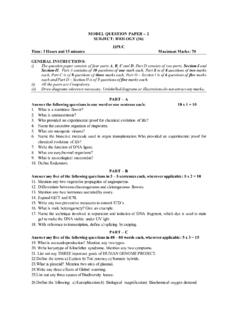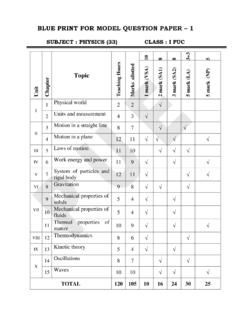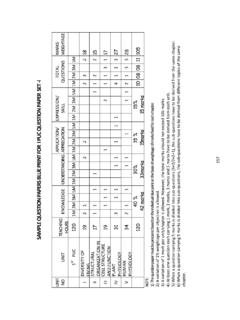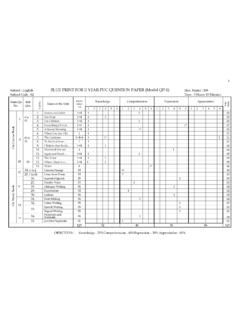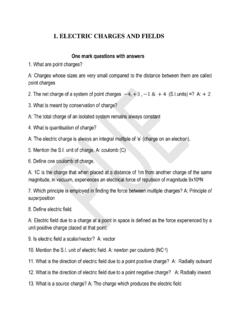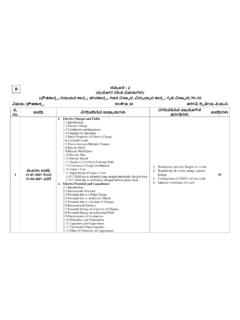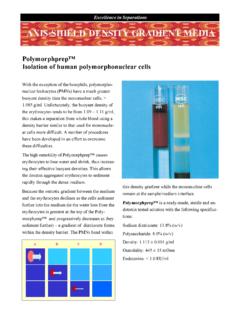Transcription of Chapter 8 Human health and diseases - Department of PUE
1 Page 1 of 8 Chapter - 8 human health and diseases ONE MARK QUESTIONS 1. Who disproved the good humor hypothesis of health ? William Harvey 2. Define health . A state of complete physical, mental and social well-being is called health . 3. What is a pathogen? A disease causing organism is called pathogen. 4. Name the confirmation test for typhoid disease . Widal test 5. Name the antibody secreted through colostrum. IgA 6. What are genetic disorders? Disorders due to defective genetic material transferred from parents to offsprings. 7. What is vaccine? A suspension of killed or attenuated pathogen or an antigenic preparation of pathogen that provides artificial active immunity. 8.
2 Define allergy. The exaggerated response of the immune system to certain antigens present in the environment is called allergy. OR The hypersensitivity of immune system towards a generally harmless foreign substance or antigen present in the environment is called allergy. 9. Name the type of antibody responsible for allergy. IgE (Present only in Mammals) 10. Name the diagnostic test widely used for the detection of AIDS. ELISA (Enzyme linked immuno sorbent assay) preliminary test. Western Blotting - confirmatory test. 11. What is cancer? A condition with uncontrolled cell division resulting in abnormal growth or excess tissue is called cancer. 12. What is metastasis?
3 Spreading of tumour cells to different parts of the body through circulatory system or blood is called metastasis. 13. What is drug abuse? Drugs are taken for other than medical use or in amounts or frequency that impairs one s physical, physiological or psychological function is called drug abuse. 14. Define alcoholism. An addiction to excessive consumption of alcohol is called alcoholism. OR The mental illness and compulsive behaviour resulting from alcohol dependence is called alcoholism. 15. What is adolescence? A period and a process during which a child becomes mature in terms of his or her attitudes and beliefs for effective participation in society is called adolescence.
4 (The transitional age from childhood to adulthood) 16. Name the plant that gives cocaine. Erythroxylum coca 17. What is addiction? Psychological attachment to certain effects associated with drugs and alcohol is called addiction 18. What is an interferon? Antiviral protein produced from virus infected cells is called interferon. Page 2 of 8 19. What is contact inhibition? Normal cells by contact with neighbouring cells inhibit or control their growth process called contact inhibition. TWO MARKS QUESTIONS: 1. Mention any four factors helpful to maintain good health . Balanced diet. Personal hygiene and regular exercise Vaccination against infectious diseases Proper disposal of wastes.
5 Controlling vectors. Life style including food and water we take, rest and exercise we give to our body, habits we have or lack, etc. 2. What is disease ? Mention two broad groups of diseases . The state where functioning of one or more organs or organ systems or the body is adversely affected, characterised by various signs and symptoms is called disease . Groups: 1. Infectious diseases 2. Non-infectious diseases 3. What is infectious disease ? Give an example. diseases which are easily transmitted from one person to another are called infectious diseases . Ex: AIDS, Tuberculosis, influenza, etc. 4. What is non-infectious disease ? Give an example. diseases which are confined to a person and do not spread to others are called non infectious diseases .
6 Ex: Cancer. 5. Define immunity. Mention two type of immunity. The overall ability of the host to fight against disease causing organisms or agents is called immunity. Two types are 1. Innate immunity and 2. Acquired immunity. 6. Mention four types of innate immunity barriers with an example each. 1. Physical barriers: Skin, Mucus coating of the epithelium lining the respiratory, gastrointestinal and uro-genital tracts. 2. Physiological barriers: HCl in stomach, Saliva in mouth (Lysozyme), tears, sweat (sudorific glands), Oil (sebaceous glands), etc. 3. Cellular barriers: Leukocytes like Polymorpho-nuclear leukocytes (PMNL-Neutrophils), monocytes, natural killer cells (lymphocytes), etc.
7 4. Cytokine barriers: Interferon s. 7. What are allergens? Give two examples. The substances that cause allergy are allergens. OR the substances to which allergic immune responses are produced are called allergens. Ex: Pollen grains, mites, dust, animal dander, etc. 8. Name any two drugs used to reduce symptoms of allergy. Anti-histamines and steroids. 9. Name two allergic chemicals released from mast cells. Histamine and serotonin. 10. What is auto immune disease ? Give an example. The misdirected immune response of the body against the healthy self cells is called auto immune disease . Ex: Rheumatoid arthritis 11. Differentiate cell mediated and antibody mediated immunity. Cell mediated immunity Antibody mediated immunity (Humoral) immunity produced by T-lymphocytes is called cell mediated immunity 1.
8 The immunity produced by antibodies in the body fluid or humor derived from B-lymphocytes is called antibody mediated immunity. 2. It reacts against transplants 2. It does not react against transplants Page 3 of 8 12. What is tumour? Mention two types of tumours. The extra mass of tissues produced due to cancer is called tumour. 1. Benign tumours (remain at their original location and do not spread to other parts of the body) 2. Malignant tumours (the tumour cells which damage, invade or migrate to surrounding tissues) 13. Write a note on different approaches of cancer treatment. Following are the common treatment approaches of cancer 1. Surgery 2. Radiation therapy (tumour cells are irradiated lethally by taking proper care of surrounding normal tissue).
9 3. Immunotherapy (patients are given substances called biological response modifiers such as -interferon which activates their immune system and helps in destroying the tumour). 4. Chemotherapy (drugs used to kill certain tumour cells, mostly cause side effects like anaemia, hair loss, etc.) Ex: Vincristin & Vinblastin from Vinca rosea, Taxol, etc. 5. Gene therapy (transformation of certain cells to produce anti tumour substance called Tumour necrosis factor-TNF) Most cancers are treated by combination of surgery, radiotherapy and chemotherapy. 14. What are opioids? Give an example. Drugs bind to specific opioids receptors present in our nervous system and gastro-intestinal tract, extracted from Papaver somniferum (Opium) plant are called opioids.
10 Ex: Opium, Morphine, Heroine, etc 15. What are cannabinoids? Give an example. The group of chemicals interacts with cannabinoid receptors in the brain, extracted from Cannabis sativa (Indian hemp) plant are called cannabinoids. Ex: Marijuana, hashish, Charas, ganja, etc. 16. List the causes of drug abuse in adolescence. a) Curiosity b) need for adventure and excitement c) Experimentation d) Peer pressure from friends e) Unstable or unsupportive family structures 17. Why sports persons often fall victims to drug addiction? Sportspersons misuse narcotic analgesics, anabolic steroids, diuretics and certain hormones. Drugs are used to increase muscle strength, to promote aggressiveness and to increase overall athletic performance.


